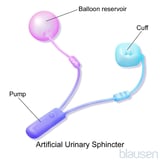I Stopped Peeing Half Way Thrn Started Peeing Again
Urinary retentiveness is inability to urinate or incomplete emptying of the bladder.
-
People who take incomplete emptying of the float may take urinary frequency or urinary incontinence.
-
If the person can urinate, doctors mensurate the amount of urine left in the bladder afterward the person urinates.
-
Doctors utilise a catheter to remove urine from the bladder and then treat the cause.
Drugs, especially those with anticholinergic effects, such as antihistamines and some antidepressants, can crusade urinary retention in both men and women. Other causes include a hard lump of stool that fills the rectum and presses on the urethra (fecal impaction Complications Constipation is difficult or exceptional bowel movements, hard stool, or a feeling that the rectum is not totally empty after a bowel motion (incomplete evacuation). (See also Constipation... read more than ) and neurogenic bladder Neurogenic Float Neurogenic bladder is lack of bladder command because of a nerve problem such as a stroke, spinal cord injury, or tumor. Uncontrollable loss of urine (urinary incontinence) is the chief symptom... read more in people with diabetes Diabetes Mellitus (DM) Diabetes mellitus is a disorder in which the body does non produce enough or answer normally to insulin, causing blood sugar (glucose) levels to be abnormally high. Urination and thirst are... read more , multiple sclerosis Multiple Sclerosis (MS) In multiple sclerosis, patches of myelin (the substance that covers most nervus fibers) and underlying nerve fibers in the brain, optic nerves, and spinal cord are damaged or destroyed. The cause... read more , Parkinson illness Parkinson Disease (PD) Parkinson affliction is a slowly progressive degenerative disorder of specific areas of the brain. Information technology is characterized by tremor when muscles are at rest (resting tremor), increased musculus tone... read more than , or prior surgery of the pelvis that damages bladder nerves.
Sometimes, people cannot urinate at all. In such cases, the bladder stretches very painfully over a few hours as it fills with urine and people have swelling in the lower abdomen.
More normally, people are able to laissez passer some urine but cannot completely empty their bladder. In such cases, the bladder slowly stretches without causing pain. Notwithstanding, people may have difficulty starting urination, a weak urine stream, or a sense that the float has not emptied completely. Because the bladder stays relatively full, people may sometimes have leakage of urine (overflow incontinence Overflow incontinence Urinary incontinence is involuntary loss of urine. Incontinence tin occur in both men and women at any age, simply it is more than common amidst women and older people, affecting about xxx% of older women... read more  ), urinating at night (nocturia), or frequent urination Excessive or Frequent Urination Almost people urinate about iv to 6 times a day, by and large in the daytime. Unremarkably, adults pass between 3 cups (700 milliliters) and three quarts (iii liters) of urine a 24-hour interval. Excessive urination can refer... read more than . Considering the retained urine can be a breeding ground for bacteria, people may develop a urinary tract infection Urinary Tract Infections (UTIs) .
), urinating at night (nocturia), or frequent urination Excessive or Frequent Urination Almost people urinate about iv to 6 times a day, by and large in the daytime. Unremarkably, adults pass between 3 cups (700 milliliters) and three quarts (iii liters) of urine a 24-hour interval. Excessive urination can refer... read more than . Considering the retained urine can be a breeding ground for bacteria, people may develop a urinary tract infection Urinary Tract Infections (UTIs) .
-
Measurement of urine remaining in the bladder later urination
If a person is unable to pass whatever urine, the diagnosis is clear.
In other cases, doctors try to see how much urine remains in the bladder later the person has urinated as much equally they can. Immediately after the person urinates, doctors either insert a catheter into the bladder to see how much urine comes out or do ultrasonography of the float to measure the corporeality of urine present. The amount of urine left after urinating is called postvoid residuum volume. If this volume is more than near half a loving cup (slightly more in older people), urinary retention is diagnosed.
Doctors practise a concrete examination, commonly including a rectal examination. In men, the rectal examination can indicate whether the prostate is enlarged. In men and women, the rectal examination helps identify a fecal impaction. Doctors may take a sample of urine to test for infection. Blood tests and imaging tests may be needed to determine the cause of urinary retention.
-
Catheterization
-
Treatment of the crusade
-
Surgery, occasionally
If people cannot urinate at all, doctors immediately insert a sparse rubber tube into the float (urinary catheter) to remove the retained urine and provide relief.
The cause of urinary memory is treated. Drugs that can cause urinary retention are stopped whenever possible. Men who have an enlarged prostate may need prostate surgery or drugs to shrink the prostate (for case, finasteride or dutasteride) or drugs that relax the muscles at the neck of the float (for case, terazosin or tamsulosin). People who have nerve problems that interfere with bladder contractions or function may need to use a catheter themselves periodically or have a catheter permanently placed. Occasionally surgery is needed to direct urine from the bladder away from the urethra and out of the body.
The post-obit is an English-linguistic communication resources that may be useful. Delight notation that THE MANUAL is non responsible for the content of this resources.
-
Urology Intendance Foundation: Electric current, comprehensive urologic health data, including a patient magazine (Urology Wellness extra®) and research updates
CLICK Here FOR THE Professional VERSION

© 2022 Merck Precipitous & Dohme Corp., a subsidiary of Merck & Co., Inc., Kenilworth, NJ, U.s.a.
Source: https://www.msdmanuals.com/home/kidney-and-urinary-tract-disorders/disorders-of-urination/urinary-retention
0 Response to "I Stopped Peeing Half Way Thrn Started Peeing Again"
Postar um comentário